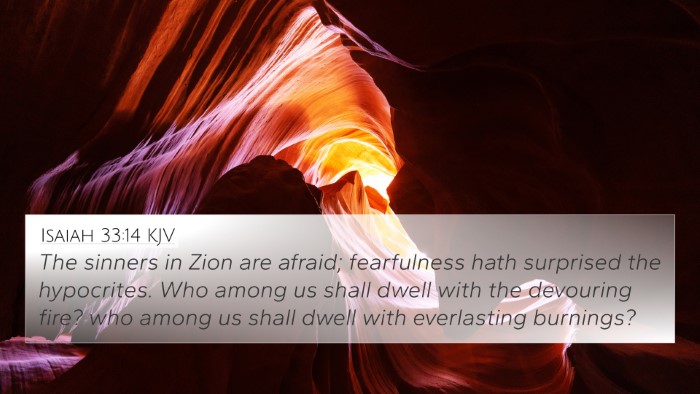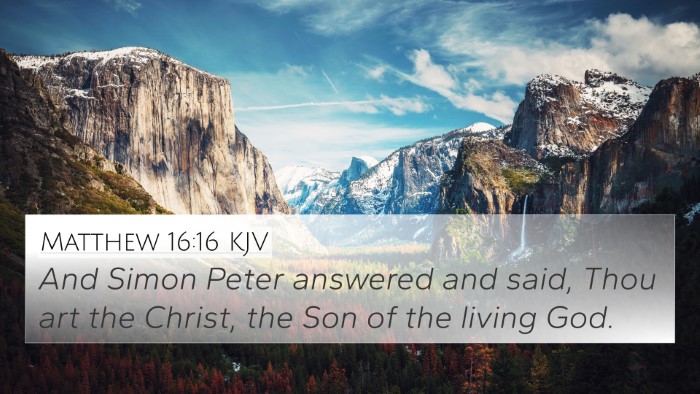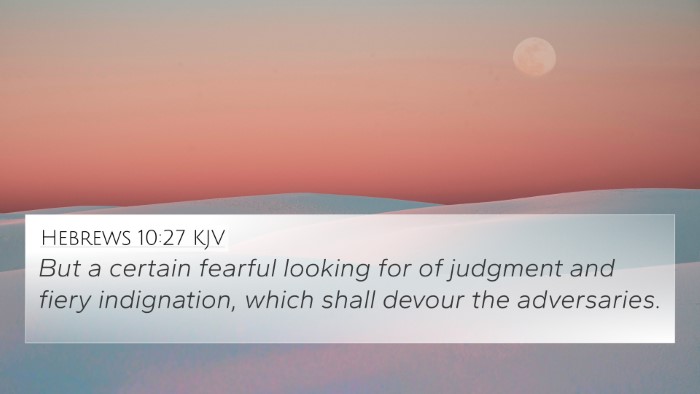Understanding Hebrews 10:31
Hebrews 10:31 states, "It is a fearful thing to fall into the hands of the living God." This verse serves as a poignant reminder of the seriousness with which we should regard our relationship with God and the consequences of falling away from faith.
Meaning and Interpretation
This verse has been interpreted by various public domain commentaries, each providing insights into its meaning.
- Matthew Henry: Henry emphasizes the weight of sin and the inevitability of judgment. He notes that to "fall into the hands" of God suggests facing divine retribution. It emphasizes the helpless state of a sinner before God's justice, highlighting that there is no escape from Divine judgment.
- Albert Barnes: Barnes reinforces the idea that the verse encapsulates the terror of encountering God's judgment for those who reject His salvation. He reflects on the contrast between the mercy available through Christ and the terror awaiting those who turn away, framing the verse as a call to reverence and caution.
- Adam Clarke: Clarke provides a broader context, linking the fear and reverence due to God with the nature of His holiness. He interprets the "fearful" aspect of falling into God's hands as stemming from His absolute authority and the seriousness of being held accountable for one's actions.
Thematic Connections
This verse also connects with other Biblical texts, forming an inter-Biblical dialogue about the seriousness of recognizing God's authority and judgement.
- Romans 12:19: "Vengeance is mine; I will repay, says the Lord." - This verse echoes the theme of God's authority over justice.
- Isaiah 33:14: "The sinners in Zion are afraid; trembling has seized the godless." - This further highlights the fear of divine judgment among those who know the truth.
- 2 Corinthians 5:10: "For we must all appear before the judgment seat of Christ." - This establishes accountability before God, linking directly to the caution in Hebrews 10:31.
- Lamentations 3:22-23: "The steadfast love of the LORD never ceases; his mercies never come to an end." - In contrast, this verse speaks to God's mercy, reminding readers of the dual nature of God’s characteristics.
- Proverbs 1:7: "The fear of the LORD is the beginning of knowledge." - This teaches the importance of reverence towards God, aligning with the fear articulated in Hebrews.
- Hebrews 12:29: "For our God is a consuming fire." - This verse emphasizes God's holiness, further contextualizing the fear of falling into His hands.
- Hebrews 6:4-6: "For it is impossible... if they fall away, to renew them again to repentance." - This continues the theme of the consequences of apostasy.
Connecting Themes
Hebrews 10:31 is significant not only in its direct warning but also in its connections to other verses that deal with judgment, accountability, and God’s nature as both merciful and just.
How to Utilize Cross-References
Studying this verse alongside its cross-references can enrich one’s understanding of Biblical theology. Tools for Bible cross-referencing, such as a Bible concordance or a cross-reference Bible study guide, can help readers identify these connections effectively.
Conclusion
In conclusion, Hebrews 10:31 serves as a sobering reminder of the consequences of straying from faith. By examining its meaning alongside complementary scriptures, believers can gain a comprehensive view of God's character and the seriousness with which they ought to approach their faith and relationship with Him.












